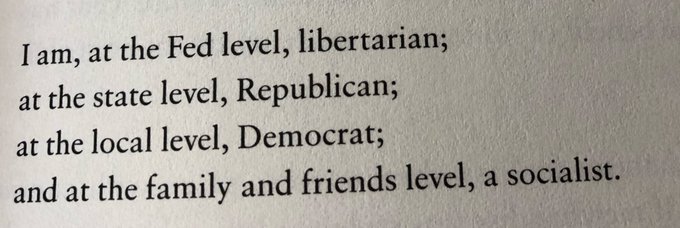I found this image recently:

What if ideologies were scale dependent? That each one of them works and has their value, but only at different levels of scale.
Dunbar’s number is a suggested cognitive limit to the number of people with whom one can maintain stable social relationships—relationships in which an individual knows who each person is and how each person relates to every other person
The cognitive limit is 150. In a village of this size, everyone is able to know everyone. Thus there are social dynamics leading to different needs. For example a village of 150 would be self-policing. But a town of 15,000 might need to hire a sheriff.
A few days later I found this video from Friedrich Hayek:
His thoughts struck me. What if profit was a symbol that allowed millions of people to act in the most altruistic manner? That the move from a concrete society (where everyone knows everyone else) to an abstract society (where it was impossible to know everyone) was facilitated by the sense-making symbol of profit.
At 150 people, altruism is an excellent sense-making tool. It’s natural, it’s instinctual, it’s innate. But at a scale of millions, altruism as a sense-making tool breaks down. Instead, an abstract symbol – profit, is used. Profit thus can be seen as altruism at scale.
Some quotes from Hayek in the video:
“Altruism is an instinct we’ve inherited from the small society where we know for whom we work for whom we serve. When you pass from this, as I like to call it concrete society where we are guided by what we see to the abstract society which far transcends our range of vision, it becomes necessary that we are guided not by the knowledge of the effect of what we do but through some abstract symbols. Now the only symbol that tells us where we can make the best contribution is profit and in fact by pursuing profit we are as altruistic as we can possibly be.”
“… because we extend our concern to people who are beyond our range of personal conception.”
“… now it is exactly this where the conflict between the traditional moral, which is not altruistic which emphasises private property, and the instinctive moral which is altruistic, come in constant conflict. The very tradition from a concrete society where each serves the needs of other people whom he knows to an extended abstract society where most people serve the needs of others whom they do not know, who’s existence they are not even aware, was only made possible by the abandonment of altruism and solidarity as the main guiding factors.”
The Broken Information Ecology
Humanity is experiencing growing pains. We have a scaling problem.
The transition from hunter-gatherer tribes of fewer than 150 people to towns of several thousand people brought about new problems not faced by tribes. Then when towns became cities, again new issues arose that were unique to cities. Every time this happened, new systems were created to solve these problems.
Now with the Internet we are going through growing pains again. New problems are arising unique to this level of scale where hundreds of millions of people can interact simultaneously. That problem is a broken information ecology.
The Hatred of Profit
Today, many seem to hate profit. Wealthy individuals like Bill Gates are expected to “give back” to society. A wealth tax is seen as something the super rich should not complain about because “nobody needs that much money.” Money is seen as the root of all evil.
But I don’t believe profit is the problem. Profit serves as a symbol for altruistic action, as Hayek explains. Thus, the wealthiest people have actually acted the most altruistically to get such wealth. Bill Gates put a laptop in the hands of hundreds of millions of people to get his wealth.
But clearly this isn’t always true. There is an element of truth in people’s hatred of profit. Crony capitalism and corruption to name two examples. Those things however aren’t because profit = bad. The problem is our broken information ecology. Profit as a symbol depends on accurate prices. Accurate prices come from accurate information.
Yet in the Internet era, information has no price. Mis-, dis- and mal-information campaigns can be run at very low cost. This surely skews the pricing process. If humanity does not have the means to accurately price things, profit as a symbol stops being meaningful.
I believe Bitcoin can solve our broken information ecology. It returns our capacity for meaningful sense-making.
Leave a Reply